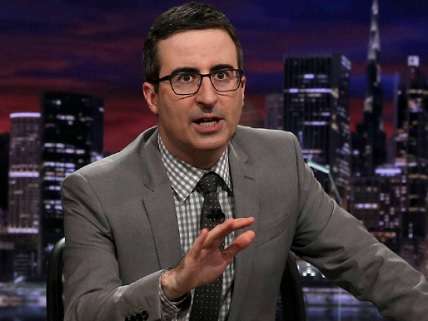Progress! John Oliver Mocks Third-Party Candidates Because They Are as Awful as Trump and Clinton
As Election Day nears, even the alt-MSM starts slagging choices beyond Dem/Rep duopoly.

On Last Week Tonight, HBO's John Oliver laid into third-party candidates Gary Johnson and Jill Stein, mocking them for being basically as silly and stupid as…well, not Hillary Clinton and Donald Trump, but Joe Exotic, who runs a big-cat park and is given to statements such as "current politicians…rape you of your rights."
To his credit, Oliver openly grants that he is only talking about Stein and Johnson because between them they are pulling close to 10 percent in national polls, more than enough to cover the spread in an election where the winner is likely to get less than 50 percent of the popular vote. Unlike, say, Carl Hiaasen, he also grants that folks voting for someone other than a Democrat or Republican might actually be doing something more than making a childish protest by voting third party. Oliver says that you might be actively embracing an alternative set of politics.
But of course, the main point is to delegitimize third-party candidates by showing them to be fundamentally unserious. Stein is written off as an anti-vaxxer and, if not quite a 9/11 truther, then close enough to disqualify her for government work. She also, Oliver demonstrates, doesn't seem to understand that the Federal Reserve does quantitative easing, not the Treasury Department.
Johnson gets slapped around for getting angry when, in a scene from the excellent documentary Rigged (watch online here), he goes off on a Bloomberg reporter who asks whether he's just a spoiler. The Great Aleppo Gaffe and (truly disturbing) The NBC Tongue-Biting Debacle make appearances, of course, as they should.
Then Oliver gets more serious. When it comes to policy, Oliver admits that "there's a lot to like there. He supports marijuana legalization and opposes the death penalty, civil forfeiture, and police militarization. But scratch beneath the surface and there are some positions you may be less comfortable with. For instance, he opposes having a minimum wage and when he says he's for smaller government, he's not kidding around." Oliver plays a clip of Johnson calling for the abolition of the federal Departments of Education, Commerce, and Housing and Urban Development and then stumbling over a follow-up question about whether these departments do anything that should be continued after their dissolution. More substantively, Oliver says that Johnson's proposed consumption tax is "overly simplified" and would hurt poor people by levying up to a 28 percent bite on everything we purchase. Citing a 2005 report, Oliver says that for Johnson's plan "to work, [the report concluded] the sales tax would have to be way more than 28 percent…and to avoid all that there might have to be savage government cuts. But rather than honestly admit that, Johnson tries to wriggle out of the problem."
Well, no. While you can argue that he's way off or that it's difficult to hit such a target, Johnson has geared his plan to be revenue neutral with current receipts of about $3.2 trillion a year. More important, at every mention of government spending, the former two-term governor of New Mexico recites that his top order of business would be to submit a balanced budget to Congress within 100 days of taking office and that the balancing would be accomplished via spending cuts (such as eliminating whole departments of the federal government). Johnson is totally up front about his desire (and, he would argue, the mathematical need) to cut government spending year over year. There's no need to "scratch beneath the surface" about that at all.
And if the litmus test is whether a candidate is serious about spending and taxes, Johnson comes out looking less delusional than either Hillary Clinton and Donald Trump, both of whom increase spending while walling off entitlement programs from any sort of reform needed to keep ever-rising and job-killing national debt in check.
But such attacks on third-party candidates sometimes work out in funny ways, often throwing publicity rather than shade in the direction of non-traditional candidates. In fact, several times during the writing of this post, I tried to call up Joe Exotic's official website, but the site apparently can't handle the traffic coming its way courtesy of Oliver's treatment from last night. In a similar way, the more that the media (and the major parties) must engage third parties (if only to dismiss them), they often achieve a very different end than the one they intend.
Here's the segment.
….


Show Comments (399)